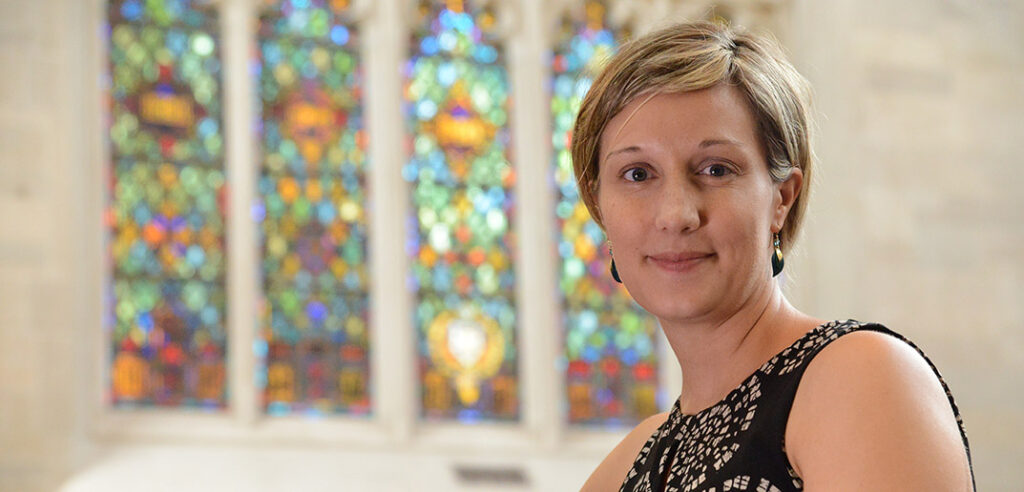“Jonathan Edwards is the bud of the bud, and the root of the root of American evangelicalism,” said Kathryn Reklis, Ph.D., assistant professor of theology.
Though the 18th-century American theologian was known for his fire-and-brimstone sermons meant to instill the fear of God, he was also a passionate follower of the new science emerging among humanist thinkers, such as Enlightenment philosophers John Locke and David Hume. For Edwards, the emotional responses to his sermons—in this case terror—were not exclusive of reason.
Reklis said that Edwards’ reasonable interpretation of his faith was part and parcel of his charismatic, emotional preaching, even if that is not always evident in the evangelical traditions that have roots in Edwards’ form of Protestantism.
“He was committed to ‘the new science’ of his day, meaning truth arrived at through experience and deduction—what we might think of as an early scientific method,” Reklis said. “At the same time, he was a strict Calvinist. To defend his understanding of Christianity, he turned to concepts of human desire, emotion, and bodily experience as proof of firsthand experience of the divine. What really mattered to Edwards was that people experienced God, and he wanted to prove that such experience was possible using the standards of the science of his day. Intense emotions and the bodily experiences that revivals often caused were this ‘proof.’”
These seemingly divergent points of view that converge in one man attracted Reklis to her subject. The result is Theology and the Kinesthetic Imagination: Jonathan Edwards and the Making of Modernity (Oxford University Press, 2014). Looking back in history, this moment was also the beginning of a division in Protestantism into those camps that emphasize reason—the so-called mainline Protestant traditions such as Episcopalianism, Presbyterianism, or Lutheranism—and the camp of evangelicalism, which emphasizes emotion. “That divide would not have made sense to Edwards,” Reklis said, “but it was one that eventually emerged.”
Reklis said she knew she would “do something on Protestantism,” but she had no idea that she’d end up focusing on the author of the sermon “Sinners in the Hands of an Angry God,” in which Edwards writes “There is no want of power in God to cast wicked men into hell at any moment.” However, Edwards’ use of a rational, scientific method to defend this type of emotional religious experience struck a chord with her.
“It was just one of those things where you fall in love with a period and a set of ideas,” said Reklis. “For me it was the ways in which the Protestant reformations introduced a whole set of ideas into Western philosophy, theology, and politics.”
Her interests extend well beyond the man and his religion, however. Her work also delves into the repercussions of religious ideas that affect what she refers to as “material practices,” such as economics, trade, the clothes people wear, the food they eat, and the practices that make up their everyday lives.
“Protestantism . . . created a revolution in the way that people organized their every day, paving the way for a period of enormous experimentation,” she said.
“It’s a period in which so many things that we take for granted now came to be, like the way the global map got drawn by the dominant countries, and [the way]early globalization took hold. All of the forces of the world we live in today were really up for grabs in the 18th century.”
Reklis’ book addresses the many 18th-century global forces that shape the world we live in today, but religion and Protestantism in particular remain at its core. In particular, she is interested in the way that 20th-century Christian theologians desire to recapture the emotional, embodied, direct, and experiential form of Christianity that Edwards tapped into.
“There’s this sense from many theologians after World War II that Christian practice has gotten too logical and organized,” she said. “The forms of Christianity that were most aligned with modernity—the colonial projects, imperialism, capitalism, and other modern forces—no longer seem as appealing in the wake of post-Colonialism and the questioning of modern imperialism.”
Edwards’ preaching was part of the Great Awakening, a period that brought ecstatic religious revivals to New England. The Second Great Awakening pushed the movement into the West and then into the South, and it became a bit more “unruly,” said Reklis.
“With the second awakening there’s an even deeper emphasis on radical bodily and emotional experiences and much more overt tension with secularism and modern science,” she said. “The tensions we live with now—like creationism versus evolutionism—come from this period.”
But Edwards, she said, would “never buy into that” tension. “One of my hopes with this project is to show that the emphasis on direct, embodied, emotional experience is not a contradiction to modernity or rationalism, but was, at least for Edwards, a modern experiment itself.”

